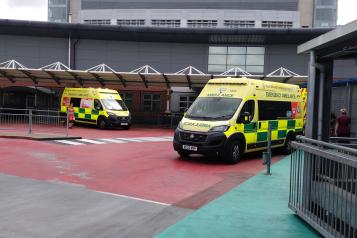Tackling heart attack myths

What are the important signs of a heart attack to look out for?
Some of the common early symptoms of a heart attack are sweating, uneasiness and chest tightness.
The NHS is reminding people to dial 999 if they experience the symptoms of a heart attack.
There are a number of common heart attack myths.
The new polling also showed that fewer than half of people said they would dial 999 if they or a loved one experienced lesser known symptoms of heart attacks.
England’s top doctor said thousands of deaths could be prevented with earlier treatment if people recognise these vital signs.
Symptons of a Heart Attack
Symptoms of a heart attack can include:
- chest pain – a sensation of pressure, heaviness, tightness or squeezing across the chest
- pain in other parts of the body – it can feel as if the pain is spreading from your chest to your arms (usually the left arm is affected, but it can affect both arms), jaw, neck, back and tummy (abdomen)
- feeling lightheaded or dizzy
- sweating
- shortness of breath
- feeling sick (nausea) or being sick (vomiting)
- an overwhelming sense of anxiety (similar to having a panic attack)
- coughing or wheezing
Although the chest pain is often severe, some people may only experience minor pain, similar to indigestion.
While the most common symptom of a heart attack in both men and women is chest pain, women are more likely to experience other symptoms such as shortness of breath, nausea/vomiting and back or jaw pain.
Act quickly for a better outcome
It can be easy to dismiss the early signs of a heart attack but it’s never too early to call 999 and describe your symptoms. The faster you act, the better the chance of a positive outcome.
- Heart and circulatory disease, also known as cardiovascular disease, causes a quarter of all deaths in the UK.
- Between April 2019 and March 2020 over 86,500 people had a heart attack (and were admitted to hospital) across England, Wales and Northern Ireland
- In the 1960s more than 7 out of 10 heart attacks in the UK were fatal. Today at least 7 out of 10 people survive
- An estimated 1.1 million people alive in England today have survived a heart attack.
What the NHS is doing to help
The NHS is aiming to restore diagnosis, monitoring and management of hypertension, atrial fibrillation and high cholesterol to where it was before the pandemic.
There are a number of ways the NHS is supporting patients to diagnose and manage their risk including:
- Rolling out blood pressure checks in high street pharmacies for the over 40s
- Implementing the NHS Blood Pressure @Home initiative with over 220,000 blood pressure monitors allocated across England so patients can measure their blood pressure well and remotely, reducing their risk of stroke and heart attack.


